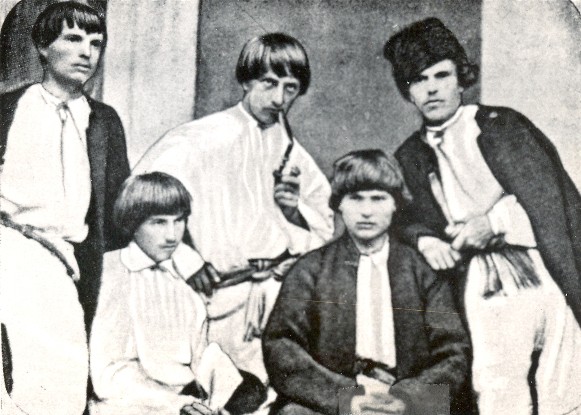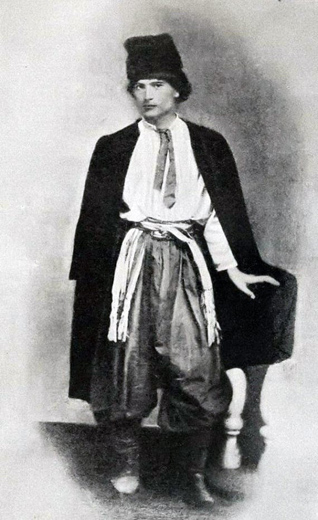Khlopoman
Khlopoman. Adherent of a populist movement of Ukrainian students and intelligentsia in Right-Bank Ukraine in the 1850s–1860s. The derogatory Polish term ‘chłopoman,’ meaning lover of the peasantry, was adopted eventually by those who propagated the notion of ‘love for the simple Ukrainian people.’ The movement, which was greatly influenced by French socialists (P-J. Proudhon, L-A. Blanqui) and democratic populism, originated among students of Kyiv University who belonged to the Polonized nobility. Recognizing the duty to serve ‘the people among whom one lives,’ they turned away from Polish student organizations and established a Ukrainian society. The khlopoman movement also had an impact on young people in Left-Bank Ukraine and Southern Ukraine, particularly in Kharkiv, Poltava, Chernihiv, and Odesa. The movement's founders included Volodymyr Antonovych, Tadei Rylsky, Borys Poznansky, Kostiantyn Mykhalchuk, Pavlo Zhytetsky, and Pavlo Chubynsky. V. Antonovych articulated its ideological principles and basic program. In replying to Polish accusations of treason and defection, he rejected the Polish nobility's social order and Jesuitism as alien to the ‘spirit of our people and harmful to its life,’ and encouraged his contemporaries to love the people, to expiate the sins of their fathers towards the people by actively serving them. Charged with collaborating with Russian revolutionaries, the khlopomany published a denial, ‘Otzyv iz Kieva’ (A Reply from Kyiv), in Sovremennaia letopis’, vol 11 (Moscow 1862). The 21 signatories of this statement rejected revolutionary methods and declared that their sole concern was to educate the recently emancipated peasantry. They also refuted the charge of separatism, arguing that separatism could have no practical significance for a mostly illiterate people. A cautious attitude towards the authorities and the conviction that educational and cultural progress must precede political action prompted them to emphasize the apolitical nature of the movement.
The khlopomany operated strictly within the law to avoid any suspicion of revolutionary activity. From 1859 they were active in the Hromada of Kyiv. They helped found Sunday schools and contributed to the journal Osnova (Saint Petersburg). During summer vacations they organized tours of Ukraine, known as ‘going to the people,’ to acquire knowledge of the land and its people. Because of their cultural and educational work, the khlopomany were falsely accused by Russian reactionary circles of being politically implicated in the Polish Insurrection of 1863–4. Despite the repressive conditions that followed, including the implementation of Petr Valuev’s ban on Ukrainian publications, they continued to participate in the work of the Hromada of Kyiv and in other community efforts.
BIBLIOGRAPHY
Antonovich, V. 'Moia ispoved’,’ Osnova, 1 (1862)
Drahomanov, M. ‘Do istoriï ukraïns’kykh khlopomaniv u 1860 rr.,’ Zhytie i slovo, 1895, no. 3
Antonovych, V. ‘Avtobiohrafichni zapysky,’ LNV, 1908, nos 7–9
Lipiński, W. Szlachta na Ukrainie (Cracow 1909)
Poznanskii, B. ‘Vospominaniia,’ Ukrainskaia zhizn’, 1914, nos 8–10
Mytsiuk, O. Ukraïns’ki khlopomany (Chernivtsi 1933)
Doroshenko, D. Volodymyr Antonovych, ioho zhyttia i naukova ta hromads’ka diial’nist’ (Prague 1942)
Suspil’no-politychnyi rukh na Ukraïni v 1863–1864 rr.: Materialy i dokumenty (Kyiv 1964)
Tabiś, J. Polacy na uniwersytecie Kijowskim 1834–63 (Cracow 1974)
Arkadii Zhukovsky
[This article originally appeared in the Encyclopedia of Ukraine, vol. 2 (1989).]


